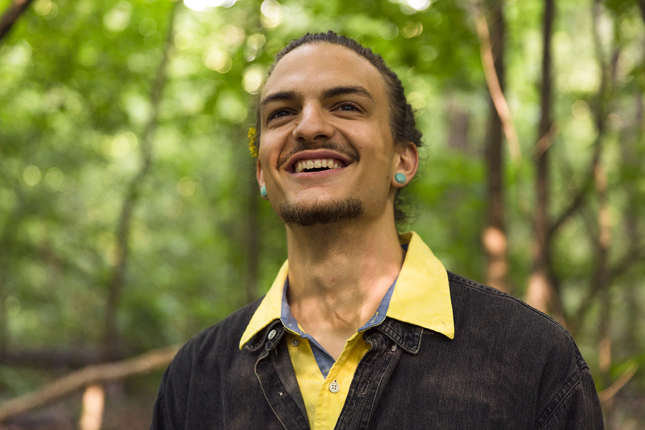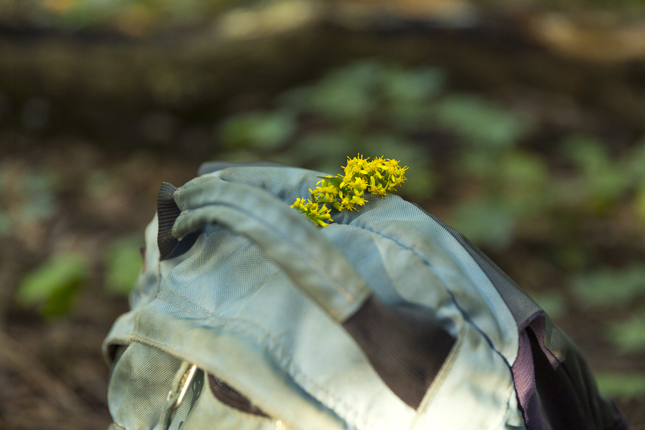
Micaiah Faraj was raised in a racially — and ethnically — diverse enclave of Milwaukee known as Riverwest. It’s where he forged his identity.
“My poetry, my dance, my level-headed perspective — all that comes from Riverwest,” he says, referring to the three things essential to his free-spirited soul. “But I really believe my ability to express all of that comes from my experiences at UW-Madison.”
But Faraj, a fifth-year L&S senior majoring in creative writing, says the road has not always been easy for him here. First semester, even just walking down University Avenue felt strange to a city kid raised in a multi-cultural environment, and his large residence hall “didn’t fit” him at all, he recalls.
He’d had an inkling of that back in Milwaukee, when, on his 18th birthday, he opened the letter from UW-Madison offering him a Promise Award, based on his financial need and academic achievements in high school.
“I remember my feelings were mixed,” he said. “I did want to come here, the letter felt like a blessing from heaven, but I was worried, too, about how I would stay once I got here.”
Faraj had grown up with his single mother and two older brothers. For several years, his mother had a paper route; sometimes she would take the boys along in the back of her station wagon and Faraj remembers those early mornings vividly: the cool air, the sunrise, the sense of the world just waking up.
“My mom was the main guide in my childhood,” he says. “My brothers were more independent, but I was more of a ‘mama’s boy.’ Eventually I have realized that she leaned on me too. I remember she read us stories at night — she would read as she nodded off, slowly mumbling and then as we woke her up again, we would all laugh. Those are precious memories, laughing through the stresses of life.”
Those stresses intensified when he arrived at UW-Madison.
“I saw nothing but white faces on the street,” he recalls. “In high school, I was exposed to so many people from different neighborhoods and ethnicities. I thought, ‘Where’s the diversity?’”
Once he transferred to the Greenhouse Learning Community, things started looking up. Faraj has always had a keen appreciation for food, which he attributes to his dad’s Lebanese heritage. With his dad, he ate things like manakeesh (a flatbread with a spice mix called za’atar) with labneh (a cultured yogurt that has a soury tang) and drank Arabic coffee.
In Greenhouse, he found like-minded friends with the same passion for diverse cuisines.
“I was eating better. I was helping to grow food,” he says. “Little by little, it started to feel like a journey.”
Courses like African dance and its history spoke to his natural inclination to move from the heart. In L&S, he discovered creative writing, and in 2014 his poem, "Dad's House Built Ours Up and Down" [read it below], was a finalist in the Juan Wallace Poetry Competition sponsored by The Madison Review, an independent literary journal published by UW-Madison. In 2014, he was named an L&S Great People Scholar.
Professors helped open his eyes, heart and mind. He recalls Teju Olaniyan, who taught a course in Afro-political music (English 461).
“I loved Teju,” Faraj says. “He always started by asking us, “how did that piece of music make you feel?” which really grounded our insights into our own personal experiences, our perspectives and cultural backgrounds, even our bodies.”
Chris Walker, who teaches courses in dance and on the history of African dance, and Amy Quan Barry, who teaches fiction and poetry, helped ignite his passion for movement and words. But there was one English teacher, Amaud Johnson, who stood out for reasons that were powerful but harder to define.
“Amaud Johnson simply was the right teacher for the right time in my life,” Faraj says. “I needed someone like him–calm, yet greatly passionate within, and he allowed me to want to learn on my own. He tried to empower us as students, to use poetry for what we value most, and [for what we] feel is calling us.”
Now Faraj is ready for the next big transition: graduation. He hopes to explore into a burgeoning interest in holistic health and social activism.
“My future depends on how I define success and meaning in life,” he says. “No matter the circumstances, we all have a choice of how to think, do and be.”
Dad’s House Built Ours Up And Down
That smell of polyurethane and dad,
his hardwood floors we assembled
after crow-barring the tree-trunk-brown
pieces into bits, excavating the underside
of dust. Our biceps built when we ripped
strength from the house and into our bones
like the glasses of milk he poured.
Our reward became more than we knew–
at that time, a chore, an activity–
but it was time with dad, as rare as
the steak we ate at that old buffet;
the chew of the meat toughened our jaws
so we knew how to clench against a punch
or fall and protect our precious tongues.
That story of cold cow tongue and dad––
hearty. He had to do those things he hated.
Character, he said; character he fed.
And character I ate alongside my brothers,
prying up wood to root ourselves in,
tearing our muscles to open to grit,
opening our mouths to the dusty drink
that swirls with a memory that seethes
in our stomachs as my father’s
red face, rabid from a loss of pride,
a rabbit gone suicide-squirrel
in the headlights struck like a deer.
When he shape-shifted no one saw
his dear heart behind the grizzle faces
he characterized with a clenched jaw.
But on that concrete road one night,
the dusk showed his raw pulsing chest
ajar as if road workers dug for plumbing.
My brothers and I walked up to the body
on that cold declining day, one carrying
a crow bar, another a glass of milk,
and I handled the polyurethane.
We said some things, cold in a circle
as the crickets sang in their monolithic tongue;
We stood in the dark, three heavy houses
torn from the woods around us,
breathing in the character
of a rabbit, a squirrel, a deer;
we lay down these three gifts––
the crow bar, glass of milk, polyurethane––
and hopped, scurried, leapt into the brush
as night dew covered the dust on dad’s skin.
– Micaiah Faraj


